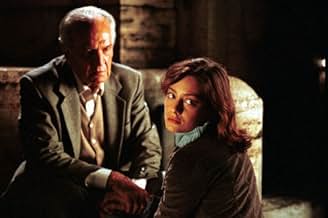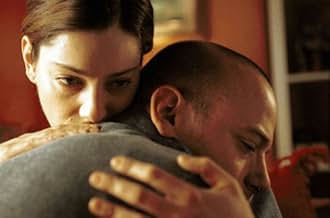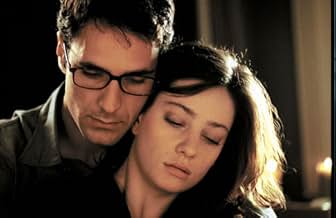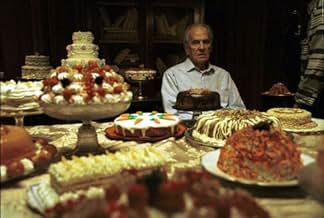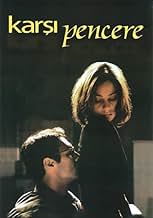VALUTAZIONE IMDb
7,2/10
12.029
LA TUA VALUTAZIONE

Riproduci clip2: 59
Guarda Facing Windows Scene: I Don't Taste Things As Good As I Once Did
Sovraccaricata e bloccata in un matrimonio ingrigito, Giovanna si prende cura dell'ebreo sopravvissuto all'Olocausto che suo marito porta a casa. Mentre inizia a riflettere sulla sua vita, s... Leggi tuttoSovraccaricata e bloccata in un matrimonio ingrigito, Giovanna si prende cura dell'ebreo sopravvissuto all'Olocausto che suo marito porta a casa. Mentre inizia a riflettere sulla sua vita, si rivolge all'uomo che vive di fronte a lei.Sovraccaricata e bloccata in un matrimonio ingrigito, Giovanna si prende cura dell'ebreo sopravvissuto all'Olocausto che suo marito porta a casa. Mentre inizia a riflettere sulla sua vita, si rivolge all'uomo che vive di fronte a lei.
- Regia
- Sceneggiatura
- Star
- Premi
- 34 vittorie e 24 candidature totali
Antonella Antinori
- Tintora
- (as Veronica Bruni)
Ohame-Brancy Chibuzo
- Alessio
- (as Ohame Brancy Chibuzo)
Recensioni in evidenza
What a rich and satisfying film this is! The complexity of lives interweaving, with a transformative impact is a rare experience in this medium.
Life is full of chance meetings...often ignored...but in this film it is pivotal. A young couple, having serious relational problems, come upon a dazed old man on the street. His entrance in their lives, his own dramatic life and the wife's (Giovanna's) ultimate connection to him serves as a link to her profound choices...First, to risk a sexual encounter with the handsome neighbor she's watched through her facing windows and second, to recognize that her discontent has been with herself, more than her loving husband. The complexity of the old man's life...his survival of a concentration camp...giving up a beloved lover to save others...his success as a famous pastry chef...all contribute in a tangential way to Giovanna's transformation. The final scene is enormously moving and meaningful.
Don't miss this gem...if humanism, great performances and cinematic richness are important to you.
Life is full of chance meetings...often ignored...but in this film it is pivotal. A young couple, having serious relational problems, come upon a dazed old man on the street. His entrance in their lives, his own dramatic life and the wife's (Giovanna's) ultimate connection to him serves as a link to her profound choices...First, to risk a sexual encounter with the handsome neighbor she's watched through her facing windows and second, to recognize that her discontent has been with herself, more than her loving husband. The complexity of the old man's life...his survival of a concentration camp...giving up a beloved lover to save others...his success as a famous pastry chef...all contribute in a tangential way to Giovanna's transformation. The final scene is enormously moving and meaningful.
Don't miss this gem...if humanism, great performances and cinematic richness are important to you.
"Facing Windows (La Finestra di fronte)" is like a very European and more sophisticated take on "The Notebook," as it shifts between romantic and culinary past and present through the in-and-out consciousness of an elderly man.
The "Rear Window" eroticism is just one element that accidentally brings together tangled, stymied lives swirling around lovely, exhausted, frustrated chef, wife and mother Giovanna Mezzogiorno, where each child, man, woman, friend and neighbor has separate priorities and fantasies that annoying real life interferes with, from the practical to the political.
Each character and their ties are both delightfully and surprisingly complex and the actors are so comfortable bringing each to complete life that you think you too should be able to come out of the theater speaking Italian so naturally.
But this is a frank, gritty, contemporary, urban Italy we don't usually get to see, with multi-racial immigrants, underemployment and a Fascist past.
The sentimentalism of the live with no regrets lesson is leavened by the seriousness of the final revelations and the compromises that each character still makes.
The music selections nicely fit each character.
The "Rear Window" eroticism is just one element that accidentally brings together tangled, stymied lives swirling around lovely, exhausted, frustrated chef, wife and mother Giovanna Mezzogiorno, where each child, man, woman, friend and neighbor has separate priorities and fantasies that annoying real life interferes with, from the practical to the political.
Each character and their ties are both delightfully and surprisingly complex and the actors are so comfortable bringing each to complete life that you think you too should be able to come out of the theater speaking Italian so naturally.
But this is a frank, gritty, contemporary, urban Italy we don't usually get to see, with multi-racial immigrants, underemployment and a Fascist past.
The sentimentalism of the live with no regrets lesson is leavened by the seriousness of the final revelations and the compromises that each character still makes.
The music selections nicely fit each character.
I very much appreciated Ozpetek's previous film, "Le fate ignoranti", which has earned him a lot of respect on the part of both audiences and critics, in Italy and beyond. I was reluctant to go see this film because of the casting of Raoul Bova (a second-rate actor who doesn't have much substance behind his good looks and began his career as a teenage heartthrob - what a pity it didn't end there) and because of the reference to the Nazi deportation of Roman Jews, which took place on October 16th, 1943 - I just felt that to use this as a pretext for a gay love story was kind of cheap. But nearly everyone I knew who had gone see the film kept me telling that it was good, so I became so curious that I decided to go. Well, my friends were absolutely right.
Ozpetek's strength is his ability to portray characters that are realistic without being obvious, so everyone can relate to them without identifying with them. He showed that already good ability in "Le fate ignoranti" as well, but this time he seems to have developed it even further. His approach is always personal, and this enables him to make films that are deeply introspective. It is the kind of films that the French are usually good at making, but Ozpetek in not an imitator. What makes his films so DIFFERENT is that there seems an emotional involvement that is very difficult to find elsewhere; at the same time, this never translates into trite sentimentalism or dull rhetoric.
This is an outstanding film, and this is so also thanks to the performances given by most of the actors. Massimo Girotti, in his last appearance before his death, shows that, at about 80 years of age, he was still able to be a first-class actor (and this explains why he featured in so many films by Visconti); after this film, which is dedicated to him, we will all miss him even more than we already did. Giovanna Mezzogiorno, the daughter of a late actor herself, also gives an outstanding performance as the woman who finds herself at the crossroads and is torn between passion and the responsibilities of everyday life, between reality and desire, just like so many of us often are. Filippo Nigro, who also featured in a minor role in "Le fate ignoranti", is given a more important role in this film, and deservedly so. The only exception is Raoul Bova, and I wonder why Ozpetek seems to have a compelling need to cast "actors" who are more sort of toy boys, mostly in secondary roles (Bova in this case, Gabriel Garko in "Le fate ignoranti"), who usually have very limited acting abilities and who almost inevitably end up faring very poorly and suffering from the comparison that is inevitably drawn between their performances and those of the other actors who feature in the films; which is even more striking if we take into account the fact that Ozpetek seems to have the ability to rejuvenate actors and to make them play characters that are very different from their clichés (as an example, consider not only Massimo Girotti in this case, but also Margherita Buy in "le fate ignoranti").
Just one word for the soundtrack, which made the film even more touching and has spawned a major Italian chart hit.
The only criticism that can be made? How come that Italian directors seem to have lost the ability to say something about the society in which they live? In the past, they were able to be sardonic about it, and to intertwine the two levels, social and personal. Now the only films they seem able to make are personal-only stories, and that's a pity.
Altogether, a deeply recommended film.
Ozpetek's strength is his ability to portray characters that are realistic without being obvious, so everyone can relate to them without identifying with them. He showed that already good ability in "Le fate ignoranti" as well, but this time he seems to have developed it even further. His approach is always personal, and this enables him to make films that are deeply introspective. It is the kind of films that the French are usually good at making, but Ozpetek in not an imitator. What makes his films so DIFFERENT is that there seems an emotional involvement that is very difficult to find elsewhere; at the same time, this never translates into trite sentimentalism or dull rhetoric.
This is an outstanding film, and this is so also thanks to the performances given by most of the actors. Massimo Girotti, in his last appearance before his death, shows that, at about 80 years of age, he was still able to be a first-class actor (and this explains why he featured in so many films by Visconti); after this film, which is dedicated to him, we will all miss him even more than we already did. Giovanna Mezzogiorno, the daughter of a late actor herself, also gives an outstanding performance as the woman who finds herself at the crossroads and is torn between passion and the responsibilities of everyday life, between reality and desire, just like so many of us often are. Filippo Nigro, who also featured in a minor role in "Le fate ignoranti", is given a more important role in this film, and deservedly so. The only exception is Raoul Bova, and I wonder why Ozpetek seems to have a compelling need to cast "actors" who are more sort of toy boys, mostly in secondary roles (Bova in this case, Gabriel Garko in "Le fate ignoranti"), who usually have very limited acting abilities and who almost inevitably end up faring very poorly and suffering from the comparison that is inevitably drawn between their performances and those of the other actors who feature in the films; which is even more striking if we take into account the fact that Ozpetek seems to have the ability to rejuvenate actors and to make them play characters that are very different from their clichés (as an example, consider not only Massimo Girotti in this case, but also Margherita Buy in "le fate ignoranti").
Just one word for the soundtrack, which made the film even more touching and has spawned a major Italian chart hit.
The only criticism that can be made? How come that Italian directors seem to have lost the ability to say something about the society in which they live? In the past, they were able to be sardonic about it, and to intertwine the two levels, social and personal. Now the only films they seem able to make are personal-only stories, and that's a pity.
Altogether, a deeply recommended film.
Having seen all of Ferzan Ozpetek's films, I looked forward seeing this new picture, which just started a commercial run locally. Without a doubt, this is even more complex than the ones before. Mr. Ozpetek is a director that shows great talent. He has worked in the screen play as well.
This is a film that presents two stories that are completely different from one another. The beginning of the movie takes us back to 1943 Rome, at the height of the war. We witness what happens in the opening sequence without any knowledge of how will it play in the total outcome of the picture.
The film then changes to present day Rome. We see Giovanna and Filippo, who are struggling to make ends meet. They meet one day a mysterious old man who is trying to give them money. They end up bringing him home since the local police can't do anything. This man, Simone, has the clue to the puzzle of the first part of the film, but that will come at the end.
Giovanna's marriage to Filippo is in danger of failure. Giovanna suddenly discovers a life in the apartment across the street. Lorenzo, who lives alone, turns out has been spying on Giovanna as well. They get to meet, but common sense prevails and their possible relationship never amounts to anything.
Giovanna Mezzogiorno is one of Italy's leading actresses. Not only is she attractive, but she can act, as well. Miss Mezzogiorno has one of the most expressive and beautiful eyes we have seen in a long time. Not only that, but she expresses so much by looking directly into the camera.
Massimo Girotti, another great figure in the Italian movies is the mysterious Simone, who in reality is Davide, a master dessert chef who owned one of Rome's most prestigious pastry shop. Mr. Girotti's magnificent presence in the film makes the most with his pivotal role.
The film is deeply satisfying. Another great film by Ferzan Ozpetek.
This is a film that presents two stories that are completely different from one another. The beginning of the movie takes us back to 1943 Rome, at the height of the war. We witness what happens in the opening sequence without any knowledge of how will it play in the total outcome of the picture.
The film then changes to present day Rome. We see Giovanna and Filippo, who are struggling to make ends meet. They meet one day a mysterious old man who is trying to give them money. They end up bringing him home since the local police can't do anything. This man, Simone, has the clue to the puzzle of the first part of the film, but that will come at the end.
Giovanna's marriage to Filippo is in danger of failure. Giovanna suddenly discovers a life in the apartment across the street. Lorenzo, who lives alone, turns out has been spying on Giovanna as well. They get to meet, but common sense prevails and their possible relationship never amounts to anything.
Giovanna Mezzogiorno is one of Italy's leading actresses. Not only is she attractive, but she can act, as well. Miss Mezzogiorno has one of the most expressive and beautiful eyes we have seen in a long time. Not only that, but she expresses so much by looking directly into the camera.
Massimo Girotti, another great figure in the Italian movies is the mysterious Simone, who in reality is Davide, a master dessert chef who owned one of Rome's most prestigious pastry shop. Mr. Girotti's magnificent presence in the film makes the most with his pivotal role.
The film is deeply satisfying. Another great film by Ferzan Ozpetek.
An Italian movie that starts as a pleasant but otherwise unremarkable tale of a nine year old marriage and an old man wandering the streets with no memory and a pocketful of money. We are drawn in by the rather lovable (if all too human and imperfect) characters until, half way through, the film explodes with moments of real beauty, passion and tenderness. The cinematography deftly weaves flashbacks and fleeting glances from within the minds of the main characters, their memories merging seamlessly for a few moments with the real life around them. The script contains gems that you want to remember.
Italian star Giovanna Mezzogiorno is superb as the wife who seems to be locked in a constant struggle with her husband and attracted to the man in the apartment facing theirs. But Facing Window proves to be far more than melodrama triangle: echoes of the Nazi holocaust and the inner strength to realize one's true feelings, as well as one's true calling ... 'it isn't enough to dream about a better life, you must demand it.' For those who like something more substantial to their cinema than popcorn and nachos, Facing Window fits the bill with effortless grace.
Italian star Giovanna Mezzogiorno is superb as the wife who seems to be locked in a constant struggle with her husband and attracted to the man in the apartment facing theirs. But Facing Window proves to be far more than melodrama triangle: echoes of the Nazi holocaust and the inner strength to realize one's true feelings, as well as one's true calling ... 'it isn't enough to dream about a better life, you must demand it.' For those who like something more substantial to their cinema than popcorn and nachos, Facing Window fits the bill with effortless grace.
Lo sapevi?
- QuizMassimo Girotti died on 6 January 2003 and the movie is dedicated to his memory. Before he was cast, Ferzan Özpetek had considered also Jean Rochefort and Serge Reggiani for his role.
- Colonne sonoreLa Finestra di fronte
Written by Andrea Guerra
I più visti
Accedi per valutare e creare un elenco di titoli salvati per ottenere consigli personalizzati
- How long is Facing Windows?Powered by Alexa
Dettagli
- Data di uscita
- Paesi di origine
- Siti ufficiali
- Lingua
- Celebre anche come
- Facing Windows
- Luoghi delle riprese
- Ponte Sisto, Roma, Lazio, Italia(where Giovanna and Filippo meet Simone)
- Aziende produttrici
- Vedi altri crediti dell’azienda su IMDbPro
Botteghino
- Lordo Stati Uniti e Canada
- 543.354 USD
- Fine settimana di apertura Stati Uniti e Canada
- 36.061 USD
- 20 giu 2004
- Lordo in tutto il mondo
- 15.535.312 USD
- Tempo di esecuzione1 ora 46 minuti
- Colore
- Mix di suoni
- Proporzioni
- 2.35 : 1
Contribuisci a questa pagina
Suggerisci una modifica o aggiungi i contenuti mancanti





